Milestones in German-Israeli relations
German-Israeli relations are shaped by the past of the Holocaust. After the founding of Israel in 1948, Germany and Israel did not establish official diplomatic relations until 1965. Despite initial difficulties, trade, science and culture developed into important areas of co-operation. Today, Germany is Israel's second most important strategic partner in the world, just behind the USA.
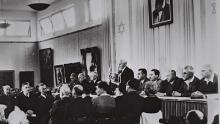
David Ben-Gurion proclaims the state of Israel in the Tel Aviv City Museum. Only a few hours earlier, the British mandate over Palestine had ended. A few hours later, the USA and the Soviet Union recognised the new state.
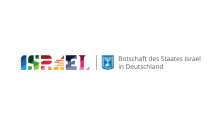
The Basic Law for the Federal Republic of Germany is promulgated in Bonn, thus constituting the Federal Republic. Originally intended "only" as a provisional measure until reunification, the Basic Law finally became Germany's constitution after reunification in 1990

In his government declaration, Federal Chancellor Konrad Adenauer expressly acknowledges the "unspeakable crimes" committed against Jews "in the name of the German people" and which "oblige us to make moral and material reparations".

September 10th: In Luxembourg, Israeli Foreign Minister Moshe Sharett and German Chancellor Konrad Adenauer sign the so-called Luxembourg Agreement. It regulated German compensation payments for the murder of Jews during the Nazi era. There was opposition to the agreement was fiercely opposed in both Israel and Germany.

July 2nd: The Israel Mission is opened in Cologne. It serves to prepare for the establishment of diplomatic relations and the processing of German reparations in accordance with the Luxembourg Agreement

September 29th: Hermann Maas, a Protestant pastor from the Black Forest, is the first Christian German to be officially invited by the State of Israel for a visit lasting several months. He had helped German Jews to escape during National Socialism. In 1964, Israel awards him the honourary title of "Righteous Among the Nations".

December 1st: In the context of the gradual rapprochement between Israel and Germany, Interior Minister Israel Bar-Yehuda proposes lifting the restrictions on the German language in cultural institutions that have been in place since the founding of the state. The Israeli government then authorised a more moderate use of the German language. The government had to confirm such decisions by 1983.

March 26th: Erich Ollenhauer, Chairman of the Social Democratic Party of Germany (SPD), is officially invited by the State of Israel. He is the first German to give a public speech in Israel.

September 15th: Willi Daume, President of the German Sports Federation, travelled to Israel to present the local sports association with a donation. The special position of sport in the first official rapprochement between the two countries led members of the Bundestag to travel to Israel disguised as sports officials after Daume's visit.

December 27th: A secret conversation between Shimon Peres and Franz Josef Strauss marks the beginning of German arms deliveries to Israel. The Director General of the Israeli Ministry of Defence visits the German Defence Minister at his home in Rott am Inn. The public only learns about this in 1964.
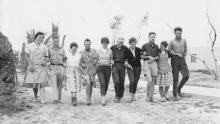
April 30th: A group of Protestant Christians led by Lothar Kreyssig founded Aktion Sühnezeichen, now Aktion Sühnezeichen Friedensdienste (ASF). They call on young Germans to recognise Germany's guilt during the Nazi era and perform voluntary service in Israel, Poland and Russia as a sign of atonement. The first group of volunteers arrived in Israel in the early sixties

The Israeli Emanuel Schaffer starts the German Football Association's coaching course at the German Sport University Cologne. Schaffer later becomes coach of the Israeli national football team. In February 1963, the first student exchange programme begins with students from the German Sport University Cologne visiting the Israeli Wingate Institute in Netanya. In 1971, the two institutes enter into the first Israeli-German university partnership.

December: The Weizmann Institute in Israel invites the German Max Planck Society to Israel. Scientific co-operation begins as the two scientific institutions move closer together. In 1964, it is sealed with the so-called Minerva Treaty. In July 1986, the German-Israeli Foundation for Scientific Research and Development, GIF, is founded. It has its headquarters in Jerusalem and a liaison office in Munich.

Motti Auerbach, son of the last rabbi of Frankfurt am Main, is chosen to represent Volkswagen in Israel. Felix Burian, who had to flee his home in Vienna in 1938, opens the first Volkswagen workshop in Israel.

March 14th: The first meeting between Chancellor Konrad Adenauer and Prime Minister David Ben-Gurion takes place at the Waldorf Astoria Hotel in New York - a neutral location. The talks centred on German support for Israel. More important, however, is the fact that this meeting, conducted in a friendly atmosphere, makes understanding between Germany and Israel and Judaism seem possible again.
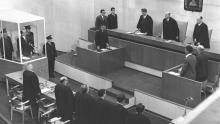
April 11th: The main trial against Adolf Eichmann, who played a key role in the Holocaust as a member of the SS in a special Gestapo division, begins in Jerusalem. The court announces the verdict on 15 December. The death sentence is carried out the following year.

Around 30 Germans take part in the first Israel study trip organised by the Federal Agency for Civic Education (BpB). By the end of 2012, the programme already had 7,300 participants on 267 trips to Israel. In December 1963, Prime Minister Ben-Gurion receives a German youth group for the first time.

May 12th: Israel and the Federal Republic of Germany establish diplomatic relations. German Chancellor Ludwig Erhard and Israeli Prime Minister Levi Eschkol agree to exchange ambassadors.

August 18th and 24th: Rolf Pauls becomes the first German ambassador to Israel. Initially, there was fierce protest against a former Wehrmacht officer as German ambassador. The Vienna-born diplomat Ascher Ben-Natan presents his credentials as the first Israeli ambassador to the Federal Republic of Germany.

Shortly after official relations were established, the first cities also began to make contact with each other, for example Berlin-Charlottenburg entered into partnerships with the cities of Or Yehuda and Kiryat Ata. Today, there are more than 100 city partnerships between Israel and Germany.

January: The State of Israel Tourist Office opens in Frankfurt am Main. Since 1987, there has been a branch office on Kurfürstendamm in Berlin, which moved to Berlin-Mitte in the 1990s; the main office has been located in Berlin since 2003. In 1974, the Tel Aviv city office of the German National Tourist Board opened and began promoting Germany as a tourist destination.

March 21st: The German-Israeli Society (DIG) is founded in Bonn. Today, the nationwide organization has around 5,500 members and its central guiding principle is "Friends of Israel come together in non-partisan cooperation to work in solidarity with the State of Israel and its people". In April 1971, the Israeli-German Society is founded in Tel Aviv. Like its counterpart, the DIG's partner organisation aims to expand dialogue between the two countries.

April 18th: The Israeli-German Chamber of Commerce is founded in Tel Aviv. On the same day, its counterpart, the German Association for the Promotion of Economic Relations with Israel, is founded in Frankfurt.

The Lufthansa office in Tel Aviv is opened and the first direct flights from Frankfurt and Munich to Tel Aviv are established.

March 19th: Members of a delegation from the Knesset are welcomed in the Bundestag. It is the first visit by a delegation of Israeli parliamentarians to Germany. On 2 April 1971, members of the German Bundestag form a "Bundestag Contact Group on Israel" with 106 members, which then becomes the Parliamentary Group. The Israeli counterpart in the Knesset is formed in 1978. In June 1971, a delegation from the Bundestag visits the Israeli Knesset for the first time.

February 22nd: Israeli Foreign Minister Abba Eban arrives at Munich Airport. His visit is the first by a member of the Israeli government to the Federal Republic of Germany.

September 5th: During the Olympic Games in Munich, Palestinian terrorists take eleven members of the Israeli Olympic team hostage. All the hostages are murdered or die in the failed rescue operation. A German policeman also dies.
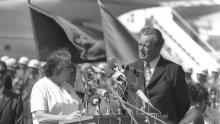
June 8th: Willy Brandt is the first incumbent Federal Chancellor to visit Israel. There he coined a lasting formula for the German-Israeli relationship: "Our normal relations have the character of speciality."

January 1st: The "Joint Provisions for the Implementation and Promotion of German-Israeli Youth Exchanges" come into force. German youth groups have been travelling to Israel since the 1950s. In 2001, the Coordination Centre for German-Israeli Youth Exchange ConAct is founded.
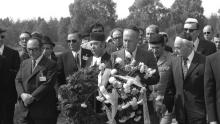
July 8th: Prime Minister Yitzhak Rabin is the first Israeli head of government to visit Germany. He begins his visit to the former Bergen-Belsen concentration camp.

September 3rd: The Israeli trade union centre Histadrut and the German Trade Union Confederation conclude a partnership agreement. It is the only one of its kind in the world.

January 1st: The Goethe-Institut, the globally active German cultural institute, opens a branch in Tel Aviv, followed by another institute in Jerusalem in 1988.
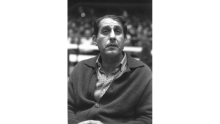
November 2nd: Israeli star basketball player Ralph Klein becomes national coach of the German national basketball team. The Berlin-born Holocaust survivor coaches the German team until 1987.

October 5th: Federal President Richard von Weizsäcker arrives in Israel. The four day visit is the first by a German President to Israel.
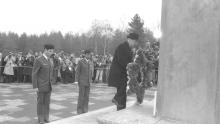
April 6th: Chaim Herzog is the first Israeli head of state to arrive in Germany. The President describes the state visit as "obvious proof of the failure of the Nazis". On the first day of his stay, he visits the former Bergen-Belsen concentration camp.

May 1st: The German Navy's training sailing ship, the "Gorch Fock", docks in Haifa harbour. It is the first time that German soldiers have set foot on Israeli soil. In May 2005, the "Gorch Fock" anchors in Haifa again as part of the 40th anniversary celebrations for the establishment of diplomatic relations.

November 9th: The fall of the Berlin Wall brings the possibility of German reunification closer. In Israel, the events are followed with concern, as the exchange of letters between Prime Minister Yitzhak Shamir and German Chancellor Helmut Kohl shows.

September 16th: Prime Minister Yitzhak Rabin is the first Israeli head of government to visit a united Germany. He gives a highly acclaimed speech at the former Sachsenhausen concentration camp.

January 16th: On the occasion of his four-day state visit to Germany, Israeli President Ezer Weizman addresses the Bundestag. The speech, delivered in Hebrew, is the first by an Israeli president at this location. Weizman is also the first foreign head of state to address the Bundestag since German reunification.

May 5th: For the first time, German officer candidates are visiting Israel to take part in a joint training programme with the Israeli army. They are also taking part in an extensive educational programme.

September 21st: Israeli Prime Minister Ehud Barak visits German Chancellor Gerhard Schröder in his new official residence in Berlin. It is the first visit by a foreign head of government following the relocation of the capital from Bonn to Berlin.

February 16th: German President Johannes Rau addresses the Knesset during a state visit. The speech, delivered in German, is the first by a German head of state at this location. He says: "Responsibility follows from history."

October 23rd: ConAct, the Coordination Centre for German-Israeli Youth Exchange, is opened in Wittenberg in the presence of Federal President Johannes Rau. The Israeli partner is the Israel Youth Exchange Council in Tel Aviv.

January 24th: To commemorate the 60th anniversary of the liberation of the concentration camps, Federal Foreign Minister Joschka Fischer addresses the United Nations General Assembly in New York. "The right of the State of Israel to exist," says Fischer, "will always remain a non-negotiable basic position of German foreign policy."

December 6th: The German-Israeli Future Forum Foundation is established in Berlin. A second office is located in Tel Aviv. The foundation is the brainchild of the Israeli President and the German Federal President. Its aim is to promote projects by young adults from both countries.

March 16th: The governments of Israel and Germany are holding intergovernmental consultations to mark the 60th anniversary of the founding of the State of Israel. Led by Prime Minister Ehud Olmert and German Chancellor Angela Merkel, the consultations are intended to help strengthen the relationship between the two states through joint political measures.

March 18th: German Chancellor Angela Merkel gives a speech in German to the Knesset. This is the first time a foreign head of government has addressed the Israeli parliament. This honour is normally only reserved for heads of state. She says: "For me as German Chancellor, Israel's security is never negotiable."

January 27th: On the 65th anniversary of the liberation of the Auschwitz concentration camp, Israel's President Shimon Peres addresses the Bundestag. He says: "While my heart is torn apart when I think of the atrocities of the past, my eyes look to the shared future of a world of young people in which there is no room for hatred."

February 25th: German Chancellor Angela Merkel receives the highest state honour "Itur Nesi Medinat Israel" from Israel's President Shimon Peres. The order honours people and organisations that have rendered outstanding services to Israel.

October 23rd: The German Ambassador to Israel, Andreas Michaelis, and the Israeli President, Reuven Rivlin, will jointly open the 50th anniversary year of diplomatic relations in Israel on 23 October. The framework for this was provided by the celebrations to mark the Day of German Unity at the ambassador's residence in Herzliya.

December 17th: The Israeli Ambassador to Germany, Yakov Hadas-Handelsman, and Federal President Joachim Gauck open the anniversary year in Germany at the lighting of the second Hanukkah candle in the Ambassador's residence in Berlin. Since January 2015, several hundred anniversary events, meetings, delegation trips, projects and new initiatives have taken place in Germany and Israel to mark "50 Years Israel - Germany".

September 7th: President Reuven Rivlin delivers a speech at the commemorative act for the inauguration of the memorial site for the twelve victims of the 1972 Olympic bombing, the 45th anniversary of which was celebrated on 5 September 2017.

30th March - 17th April: For the first time, Israeli soldiers, 300 Israeli paratroopers, took part in a major military exercise organised by the Bundeswehr at an American military base in Bavaria. It was attended by 14 other nations under German leadership.

January 27th - 29th: To mark the 75th anniversary of the liberation of Auschwitz, President Reuven Rivlin visited Berlin at the invitation of Federal President Steinmeier and gave a speech to the German Bundestag on 29 January.
